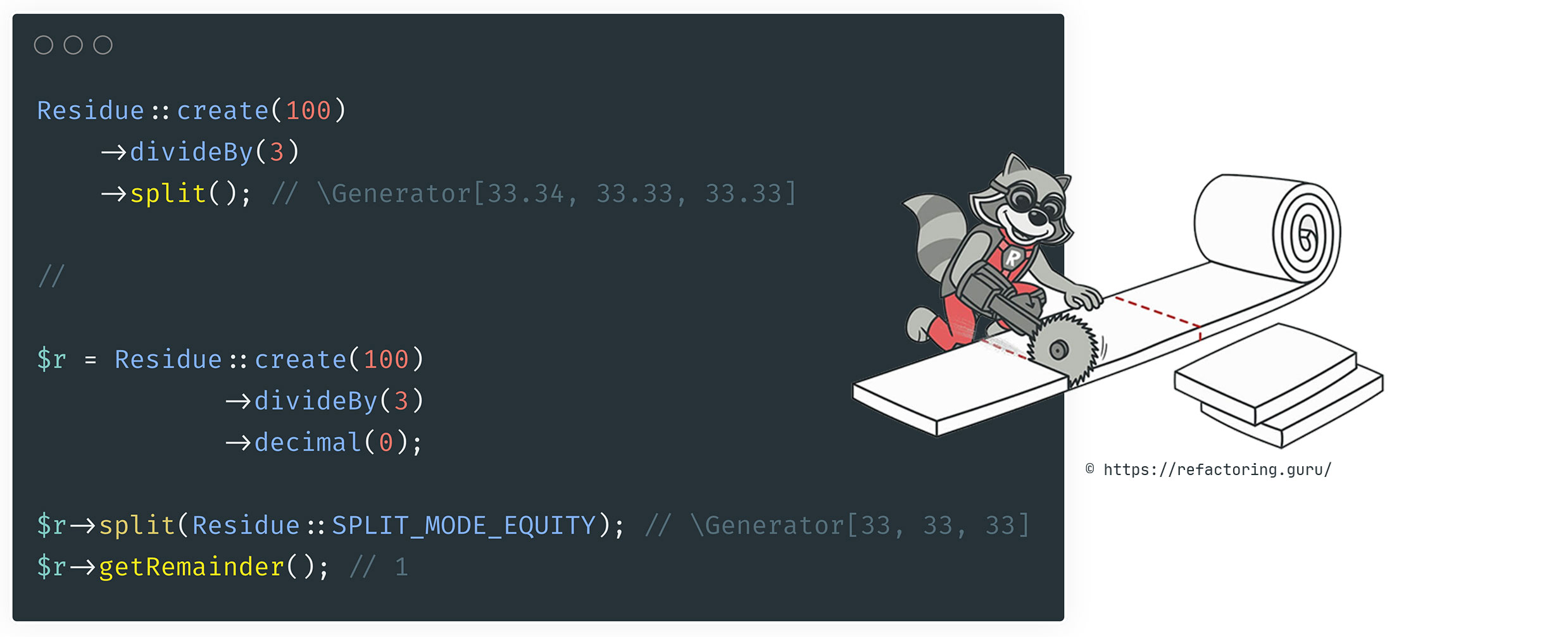This dependency-free package provides a split method to help you split float into parts, with the possible distribution of any remainder.
It is also possible to specify a rounding of the divided amount, for example rounding by 0.05.
🕹 Try out Residue on the online tester! »
You can install the package via composer:
composer req romainnorberg/residueThis package require >= PHP 7.4
This package does not deal with the notion of currency and being more basic, it is up to 40 times faster on basic operations than the brick/money package
Benchmarks: residue-vs-brick-money
Residue::create(100)->divideBy(3)->split(); // -> \Generator[33.34, 33.33, 33.33]
// or
Residue::create(100)->divideBy(3)->toArray(); // -> [33.34, 33.33, 33.33]Residue::create(100)
->divideBy(3)
->step(0.05)
->split(); // -> \Generator[33.35, 33.35, 33.30]With remainder:
$r = Residue::create(7.315)
->divideBy(3)
->step(0.05);
$r->split(); // -> \Generator[2.45, 2.45, 2.40]
$r->getRemainder(); // -> 0.015SPLIT_MODE_ALLOCATE is default mode and try to allocate the maximum of the value according to step.
$r = Residue::create(100)
->divideBy(3)
->decimal(0);
$r->split(); // -> \Generator[34, 33, 33]
$r->getRemainder(); // 0
//
$r = Residue::create(101)
->divideBy(3)
->decimal(0);
$r->split(); // -> \Generator[34, 34, 33]
$r->getRemainder(); // 0SPLIT_MODE_EQUITY mode try to allocate equally the maximum of the value according to step.
$r = Residue::create(100)
->divideBy(3)
->decimal(0);
$r->split(Residue::SPLIT_MODE_EQUITY); // -> \Generator[33, 33, 33]
$r->getRemainder(); // 1
//
$r = Residue::create(101)
->divideBy(3)
->decimal(0);
$r->split(Residue::SPLIT_MODE_EQUITY); // -> \Generator[33, 33, 33]
$r->getRemainder(); // 2This package uses generator to reduce the memory used
With foreach statement (using generator):
$r = Residue::create(100)->divideBy(3);
foreach ($r->split() as $part) {
var_dump($part);
}
float(33.34)
float(33.33)
float(33.33)To array:
$r = Residue::create(100)->divideBy(3);
var_dump($r->toArray());
array(3) {
[0]=>
float(33.34)
[1]=>
float(33.33)
[2]=>
float(33.33)
}composer testPlease see CONTRIBUTING for details.
If you discover any security related issues, please email [email protected] instead of using the issue tracker.
- Romain Norberg
- All Contributors
- Illustration from Refactoring.Guru https://refactoring.guru/
The MIT License (MIT). Please see License File for more information.




